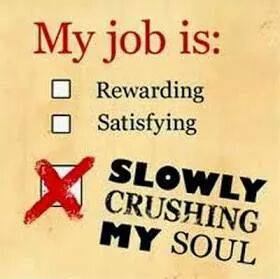In the February 14, 2017 Ask The Headhunter Newsletter, a reader discovers topgrading and the A, B, Cs of hiring.
Question
As an employer and interviewer I’ve been reading about topgrading and would appreciate your thoughts and expertise on this topic.
- How familiar are you with it?
- Have you performed many topgrading interviews?
- Have you seen many companies using it? How well did it work for them?
- Do you know any topgrading experts I could connect with and learn from?
 Nick’s Reply
Nick’s Reply
I don’t have to drink cynicism to know it’ll poison me. And I think topgrading is as cynical a way to assess job applicants as any job-interview tool you’ll encounter.
Topgrading was invented as a selection technique by Brad Smart at General Electric, during the tenure of “Neutron Jack” Welch, the CEO who invented stacked ranking of GE employees. It’s hard to tell which idea was the parent and which the evil spawn.
Also known as “rank and yank” and “forced ranking,” stacked ranking was how Welch routinely got rid of 10% of his workforce. Managers were forced to rank all employees and to fire the bottom 10% — supposedly the weakest ones. As you can imagine, a team of top workers runs paranoid when everyone knows 10% will be cut regardless of how productive they are.
In other quarters, the practice is known as an HR Witch Hunt.
Topgrading is really nothing more than stacked ranking applied before hiring.
I’ve never performed a topgrading interview because I want to go to heaven. And I don’t have clients that use it because I wouldn’t subject my job candidates to it. If you want to find a topgrading expert, you’re on your own.
What is topgrading?
It’s worth understanding what topgrading is, especially if you’re going to be subjected to it when you’re applying for a job.
Like stacked ranking, it assumes that there are three kinds of workers. A people, who are worth keeping or hiring. B people, who aren’t. And C people, who have a kind of corporate leprosy or pellagra and will infect your A people if you let them in the door. (Don’t worry, there’s a way to keep them out — we’ll get to it.)
If you view the world as A, B and C people, you have no business in business. You’re a cynic who likes everything neatly labeled, and who likes things that don’t change.
The other big idea in topgrading is that you can figure out who’s an A, a B, and a C. Of course — here it comes — you can pay Topgrading, Inc. to learn how to separate the As from the Bs and Cs. The company claims its sorting method yields 75% A hires.
If you believe that, you probably have a stockbroker whose stock picking method delivers 75% winning investments. Which means you lost all your money to Bernie Madoff.
You might well ask, if Topgrading delivers 75% A hires, why isn’t every company using it? You might well ask.
A bad attitude
Ranking people to identify who will and won’t succeed isn’t so much a mistaken idea as it is a bad attitude.
Topgrading is based on a cynical premise — that candidates lie in job interviews. That’s a hoot coming from the guys who invented it — interviewers from GE who fooled loads of companies into using stacked ranking.
I’m not a fan of tricky interview methods. It would be interesting to see a corresponding methodology that attempts to identify employers who lie in interviews, and when they’re recruiting.
Consider what Topgrading, Inc. says to managers who’d like help hiring more effectively:
- “there’s no verifying if candidates tell you the truth”
- “Topgraders hire A players most of the time using because they use the ‘truth serum’ technique”
- “It is an inexpensive tool that scares away low performers”
It sounds like a panacea for managers who believe most job applicants — non-A people — are liars that need to be scared away. Perhaps an effective sorting technique for companies is to look at which managers want to use topgrading, and fire them to get rid of the cynics.
The big idea
There’s just one big idea in topgrading: a technique used to expose all the liars who apply for a job.
Topgrading, Inc. calls this big idea “Threat of Reference Check” or TORC. It’s simple. You threaten all job applicants with reference checks before you even let them in the door. Here’s how they explain it:
“Because candidates know they will arrange reference calls, they tell the whole truth. And finally, you verify everything by talking with bosses (and others YOU choose); there is no phone tag because candidates arrange those calls.”
Get it? This threat “scares away low performers.”
An HR exec unloads on topgrading
Mike Smith is an HR executive in the San Francisco Bay Area who produces a blog called Back West. He rips the heart out of topgrading in Talent Wars: The “A” Player Hoax.
Smith says topgrading is a lie, and cites “performance research wonks” whose work suggests topgrading is simplistic:
“The prevarication that success comes to companies that systematically hire and develop only ‘A’ players is twofold:
- “One, that talent is innate and that you really can’t do much to develop the 65% of your workforce that are “C” players, and
- “Two, that filling your roster with all stars – and forgetting about things like right role, right culture, right boss and workgroup – is the simple (although it’s simplistic) fix.
Smith offers this caution to gullible employers: “Performance, both with individuals and organizations, just doesn’t work that way.”
The stack crashes
I think the best evidence that topgrading is crap lies in the highly publicized crash of Neutron Jack’s stacked ranking.
In 2014 The Wall Street Journal declared, “It’s Official: Force Ranking Is Dead.” The HR blog, Namely, tells how GE settled a $500 million lawsuit alleging forced ranking was biased against women. Yahoo! got sued over a claim that forced ranking was rigged — against men. In 2015, The Atlantic ran story about How Millennials Forced GE to Scrap Performance Reviews.
It turns out you can’t invest your money using a special method that ensures 75% of the time you’re going to win. And you can’t ensure 75% of your hires will be A people because, well, there’s no such thing as A, B and C people — or a way to separate them into bins.
Topgrading ranks right up there with Jack Welch’s two-dimensional vision of how to manage people — “rank and yank.”
There are far better, more direct ways to assess job candidates. For example, invite them into live, working meetings of your team, and watch how they behave and perform. (See Big Data, Big Problems for Job Seekers?)
Run
The prevalence of indirect job candidate assessment methods like stacked ranking and topgrading has led management in America off a cliff. Perhaps it’s because managers expect just-in-time, perfect hires. They have no idea how to develop and invest in their employees. If they did, they’d know how to find them and interview them, too. (See HR Technology: Terrorizing the candidates.) If managers were looking for talent, they wouldn’t be using techniques that focus on finding liars.
If you’re a job seeker, and a company tells you it does uses topgrading interviews, I think that should tip you off to find out whether management also practices stacked ranking — openly or surreptitiously. If it does, my advice is, Run. It’s not healthy to work for cynics. Find an employer that respects you. (See Smart Hiring: A manager who respects applicants, Part 1.)
Have you been topgraded, sliced, diced and cut from the list? Ever been stack ranked, yanked and jerked around? Ever interview with a company that assumes you’re a liar? If you think tograding is a great idea, tell us the A, B, Cs of how it works for you.
: :
Would you ever advise quitting a job before having another one lined up? I have completely lost faith my employer and job and I fear getting fired or worsening what’s left of my relationships here. I’d like to quit now. Is that a bad idea? Thanks.
 Unemployment bias and misery
Unemployment bias and misery
 Question
Question “Hospitals, nursing homes, home care agencies and doctor’s offices, like a lot of employers across the country, have a specific resume in mind. Employers often want new hires to have experience in a specialty such as operating room nursing.”
“Hospitals, nursing homes, home care agencies and doctor’s offices, like a lot of employers across the country, have a specific resume in mind. Employers often want new hires to have experience in a specialty such as operating room nursing.” WANTED: Top Talent Cheap!
WANTED: Top Talent Cheap! I keep getting random e-mails from recruiters. I have finally hit the breaking point and now I have a new response: “Thank you for your interest. I am not searching at this time. In addition, I work only with hiring managers, never a recruiter.”
I keep getting random e-mails from recruiters. I have finally hit the breaking point and now I have a new response: “Thank you for your interest. I am not searching at this time. In addition, I work only with hiring managers, never a recruiter.” My daughter worked an entry level position for a clothing chain in New York, and left to move to California. Her three managers each wanted her to stay, and said they would act as references, because she showed initiative on the job. Since she did what needed to be done instead of just what she was told to do, they wanted to keep her with the company, even if not in their store. She followed the chain’s instructions, and brought a completed application to a store that has openings in California, according to their website. Despite that, they told her they don’t have openings.
My daughter worked an entry level position for a clothing chain in New York, and left to move to California. Her three managers each wanted her to stay, and said they would act as references, because she showed initiative on the job. Since she did what needed to be done instead of just what she was told to do, they wanted to keep her with the company, even if not in their store. She followed the chain’s instructions, and brought a completed application to a store that has openings in California, according to their website. Despite that, they told her they don’t have openings. Nick’s Reply
Nick’s Reply I worked as an intern while in college, and after graduation they offered me a job. It was my first experience negotiating higher job offers. I discussed my proven performance and gave examples that demonstrated my value. The employer granted me the higher salary.
I worked as an intern while in college, and after graduation they offered me a job. It was my first experience negotiating higher job offers. I discussed my proven performance and gave examples that demonstrated my value. The employer granted me the higher salary.